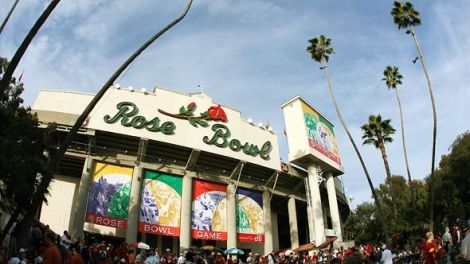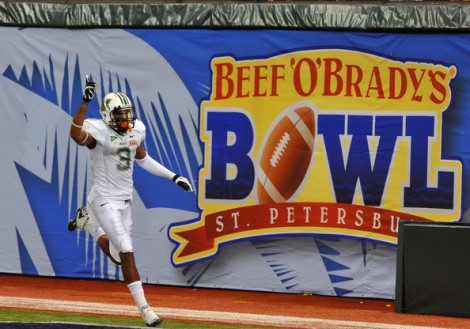[With The Alumni Club, we take a few moments out of every Monday to extoll and lament the wonderful world of college sports.]
“…look around, motherf***er. This look like the dawn of a new day to you?”
— Ellis Carver, The Wire
June 26, 2012. That was the day NCAA presidents voted to approve what’s likely to be a permanent shift in college football — from the much-maligned BCS postseason model to a four-team playoff. “Finally,” cried thousands of face-painted tailgaters in unison, “a chance to prove the true champion on the field!”
If you’re going to tout yourself as a champion, you damn well better prove it on that proverbial field. Nothing grinds the collective gears of a fanbase like institutional incompetence screwing with the game they love — exhibit A being the comically massive pile of death threats addressed to the bumbling brigade of stand-in NFL referees this fall.
The BCS has long been a whipping boy for critics who correctly cite its inefficacy (read: shittiness) in performing its basic purpose — and indeed, a poll conducted by ESPN found that 77% of people find the playoff model to be a step in the right direction.
Though it may seem contradictory to the ensuing article, I don’t directly oppose the implementation of a playoff in college football, at least as an alternative to the current model. I want to approach this heated topic from a slightly different angle — this won’t be one of the countless pieces that plot the pros and cons of various scenarios. I have no wish to examine how factors like market shares and program revenues will be bolstered by this or that method.
That’s because I believe people are largely asking the wrong questions. Many view the playoff as a solution to a definitive problem (ie. the BCS), when in truth both are an outgrowth of a flawed mentality.
 Let’s take a step back and review some history. The term “bowl game” comes from Pasadena, where the first postseason college football game was played in the so-shaped Rose Bowl Stadium. That “old grandaddy of them all” began (in earnest) in 1923, and though other venues began to see the value in such contests (a value which, for them, was measured in potential tourist dollars), the slate of other “bowls” increased to a total of only ten contests by 1970.
Let’s take a step back and review some history. The term “bowl game” comes from Pasadena, where the first postseason college football game was played in the so-shaped Rose Bowl Stadium. That “old grandaddy of them all” began (in earnest) in 1923, and though other venues began to see the value in such contests (a value which, for them, was measured in potential tourist dollars), the slate of other “bowls” increased to a total of only ten contests by 1970.
Over those fifty years, and for some time after, the bowls served as a showcase — the spoils (can you say paid vacation?) earned by a team in proportion to their seasonal results. A team who won their conference was deemed a champion, and a bowl birth became like a cherry on top.
Of course, over the last forty years, the world has shrunk exponentially — with air travel an increasingly feasible option for teams, fans of the sport began to expand their view of the sport beyond the conference level. Already by 1936 an eager sports editor created the AP poll, meant as a measuring stick to compare programs across the many conferences, and in 1950, a coaches’ poll followed suit.
The polls began as a glorified exercise — after all, how could you truly compare these dozens of schools of different sizes playing in conferences of different levels? This emerging desire to make everything in college football neat and symmetrical has reached obsessive heights in the modern era, when in reality its an inherently messy beast.
* * *
What makes college football’s regular season the most exciting in sports is the importance of every game. Though the conference format began as a form of practical necessity, it has leant the sport a wonderful gift: tradition. Playing the same several teams every year forms a familial atmosphere, and more importantly the grudges that turn to heated rivalries (that far eclipse anything in pro sports). The passion and pageantry of those Saturday mornings are fraught with such emotion because the stakes are high every week.
To draw a comparison to their counterparts, those Sunday mercenaries (I kid, I like the NFL too), the Green Bay Packers can lose two of their first three games and it’s a blip on their radar. The Giants don’t really need to turn it on until mid-December (much to Patriots fans’ ongoing chagrin). Historically in college football, there’s only two sure bets. The conference foe you’re facing doesn’t like you, and this is your only shot to beat them for a full year.
Think of it this way — college football has produced innumerable classic games, even multiple assigned the lofty tag, “The Greatest Game Ever Played.” It’s the only sport in America where such a game can occur in week six. When was the last early June MLB game that hung in anyone’s memory more than another week? With so much focus attributed in the professional leagues to the playoffs, the regular season gets reduced to a glorified footnote.
In the final week of the college football season, many of the most deeply rooted and spiteful rivalries play out from coast to coast. Alabama vs. Auburn. Michigan vs. Ohio State. Clemson vs. South Carolina. The next day, a half dozen pro teams leave their starters on the bench to get ready for the games that actually count.
It’s not the playoffs that directly compromise the well-entrenched tradition of the sport — it’s the entire fraudulent line of thinking that there’s a way to compare 120(!!!) vastly different programs, or furthermore that you’d want to. I get that sports are based on the human desire to compete, to prove superiority, and to crown champions. But if there’s one thing the BCS experiment proved, it’s that there isn’t a foolproof way to define a national champion in this context without pissing somebody off.
As those in charge tinker with the system, whether it be a 4, 8, or 16-team bracket, there will always be cries from the 5th, 9th, or 17th best team that was just left on the outside looking in. Something (in this case, the cynical old man who rents a small space in my brain) tells me a 16-team postseason is an eventuality, which I audibly groan at for two reasons.
1. It’s ridiculous that a team who went undefeated in the regular season would then need to win four straight games against the best teams in college football.
2. Watching USC and Alabama play an additional month of football will do nothing to enhance my love for the sport.
I like that the bowls give teams an opportunity to showcase themselves at the end of the season, but people who complain about the current system have plenty of merit. In 1970, only 20 worthy teams made postseason play. This year a team without a winning record gets to spend the holidays in metro Detroit, where they have the pride to compete in a game named in honor of a 5-dollar pizza company.
* * *
In order to re-legitimize the stakes of the postseason, the answer is to trim the fat. I mean, there is a Beef ‘O’ Brady’s Bowl. There’s a Famous Idaho Potato Bowl. I’m not making this up, I swear. This month a 6-6 Michigan State team will play in a bowl game, and I can guarantee you it will not be fun to watch. So just apologize to Buffalo Wild Wings and GoDaddy.com, and reveal that their bowl games are no longer (better yet, can we try to erase any memory that those existed?). Reward those 20-30 teams who actually had great seasons.
And how do we solve the problem of how to crown the national champion? My proposal is pretty simple. Remind ourselves that it was never really a problem to begin with.
Maybe my mindset is just a misplaced grasp at some sense of nostalgia — a retreat toward tradition in the face of an ever-complicating world order. I’ll grant there’s some truth to that. But unlike the NFL, or the NBA, or the MLB, or the NHL (if that’s even still a thing), college football is tradition. It’s the lifeblood that runs through current student athletes as they partake in the same, seemingly mundane ceremonial moments — the touching of a banner, the singing of a fight song, the feeling that, for several hours every Saturday afternoon (and at least a few after), there’s nothing more important than this.
It’s the old grandaddy of them all — a big, old irregular mess of a thing.
And it’s beautiful.



The best college football explanation ever! Thanks!!
Great article, in that it made me realize one thing: I don’t care about tradition anymore. I want a playoff system. I hate the BCS and I’m rooting for its demise. I see your points, but tradition was killed by greed and conference realignment. That’s what happened when college football was turned into a business, even though it involves student athletes who are not payed for their hard work. Its sad but true, really. Do I approve of it? No, because I think its going to hurt players. Anyways I’m not going to rehash old arguments, especially ones covered in better fashion by people such as some of the fine columnists on Yahoo Sports who are arguing for a playoff system.
Well written. I’m embarrassed for our country that a thing called the ‘Beef ‘o’ Brady’s bowl’ exists. Still though, having come from a MAC school, it’s nice when lesser teams get a chance to have post-season play. While CMU vs WKY might not have the viewership draw of other teams, it’s nice for the fans. Due to the lower viewership, corporate sponsors need to be found, like Little Caesers. You’ve gotta make money somehow.
Good analysis. I have to agree that finding a National chapion in a sport with over 100 teams and each plays only 12 games per year is futile. I agree that the localized rivalries are the fun thing, especially for the students, who can then go to the game! Let’s enjoy the season and the bowl games, and not require a national champ. That works for sports where they can play every or every other day. But not for football.
Another thought is to get rid of the coaches poll. Honestly, they do not know enough about other teams to be able to rank them fairly. Most have an assistant fill out their form anyway. That poll is entirely political.
Good points. The same could be said for the Heisman award. If it’s hard to find a National Champion in a sport with over 100 teams, how can there possibly one best player in all of college football? And the Heisman candidacy is not limited to only Division 1 football…It’s a real shame it was ever brought into the sport. It a big distraction and a big waste of time and money.
“2. Watching USC and Alabama play an additional month of football will do nothing to enhance my love for the sport.”
I don’t get what you are saying here…Is this an insult or a compliment?
pyoung1958 — Neither, really, just a bit glib way of saying that I don’t think I’ll attain an additional appreciation for the sport with the institution of a large-scale playoff. Selected those specific teams as examples of frequent BCS (and likely playoff)-goers — should they exert their usual dominance in-conference, I’m comfortable recognizing them as the great teams they often are.
Watching them “prove it” again in a playoff would be redundant to my evaluation.
Ah…makes much better sense now. Thanks for the response. Great article by the way. Enjoyed it immensely.
You’ve missed a big point. Playoffs will inevitably expand, and eventually kill the stupid “only in it for the commercials” bowls.
I’m looking forward to the day that there are only a few bowls, and they are viewed the same way as the NIT tournament in basketball: hangovers from a previous era, perhaps profitable but completely irrelevant.
If the only two choices are a 16+ team playoff and the current bowl system, I’m not sure which is the lesser of two evils. My beef with the bowls is less about the commercialization and more with the bloat (though the latter perhaps owes itself to the former). As far as the annoyance of corporate sponsorships go, though, it’s not like they can’t make a “NCAA Football National Semi-Final Exclusively Brought to you by Pampers.”
I’m not sure that playoff expansion is logistically feasible. Consider how few games teams presently play. A 16 team tournament would require a team to possibly play four extra games. A 32 team set-up could be playing games in February. Only one of those teams would get to win something worthwhile. (Although I’m sure semi-finalist would be worth something) Furthermore, four or five added games increases costs for the schools (UM almost didn’t send their marching band to their opener due to cost) and increases the likeliness of an injury (something players aren’t adequately compensated for). 32 seems
Ben — As far as school costs, I really wish an inevitable playoff would consider setting the games on the actual campuses of those involved (as opposed to neutral sites like the current bowls, which is what it’ll be under the 4-team system). Not only would it decrease travel costs, but the atmosphere would actually feel like a college football game. And I totally agree with you on the larger-scale models, it doesn’t really make sense for anyone involved but those who either stand to profit, or aren’t taking the nature of the sport into account. The national championship always feels weirdly late to me on Jan. 8 or so, I wouldn’t want to extend it any further. New Year’s Day, please.
Every otgher division has at least 20 teams in the postseason. FCS has 20 d-2 has 24 . d-3 has 32. d3 handles it by playing 10 regular season gaes, with the finalists playing 15. d3 has 23 conferences, d1 has 10, but d1 also has divisions. put all the conference and division champs in and have at large teams, like Alsabama or Notre Dame, get in. End the Regular season in November and play out the tournament though December, each week has fewer games, semis on New Years final a week later. 32 for me is the max you can have and D3 pulls it off well.